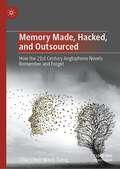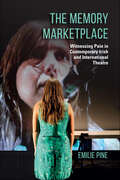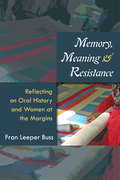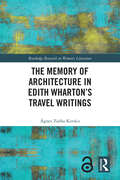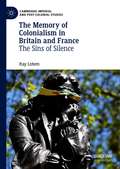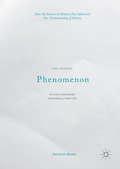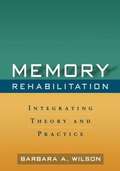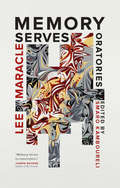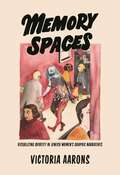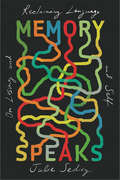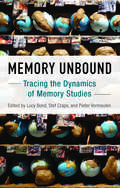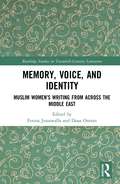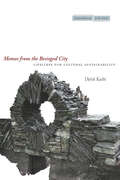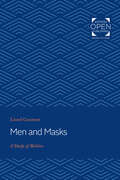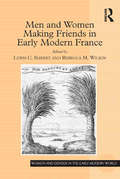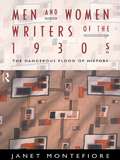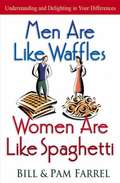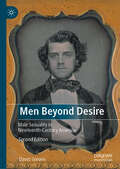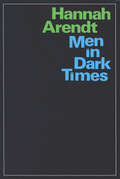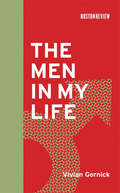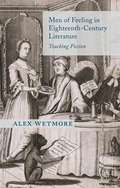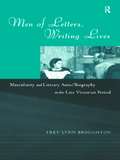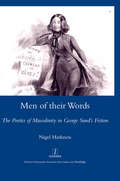- Table View
- List View
Memory, Language, and Bilingualism
by Jeanette Altarriba Ludmila Isurin"The relationship between memory and language and the topic of bilingualism are important areas of research in both psychology and linguistics and are grounded in cognitive and linguistic paradigms, theories and experimentation. This volume provides an integrated theoretical/real-world approach to second language learning, use and processing from a cognitive perspective. A strong international and interdisciplinary team of contributors present the results of various explorations into bilingual language processing, from recent advances in studies on bilingual memory to studies on the role of the brain in language processing and language forgetting. This is a strong yet balanced combination of theoretical/overview contributions and accounts of novel, original, empirical studies which will educate readers on the relationship between theory, cognitive experimentation and data and their role in understanding language learning and practice"--
Memory Made, Hacked, and Outsourced: How the 21st Century Anglophone Novels Remember and Forget
by Chia-Chieh Mavis TsengThis book probes the complex relationship between memory and storytelling in contemporary literature. It not only examines how memory is constantly made and remade through words and stories but also explores how literary practices and imagination are shaping new concepts of memory in the 21st century. By analyzing the selected novels – Penelope Lively’s The Photograph, Tom McCarthy’s Remainder, Julian Barnes’ The Sense of an Ending and The Only Story, Kazuo Ishiguro’s Never Let Me Go, and Felicia Yap’s Yesterday – this book explores the dynamic interplay of remembering and forgetting, and redefines the relationship between fiction and memory in the 21st century.
The Memory Marketplace: Witnessing Pain in Contemporary Irish and International Theatre (Irish Culture, Memory, Place)
by Emilie PineWhat happens when cultural memory becomes a commodity? Who owns the memory? In The Memory Marketplace, Emilie Pine explores how memory is performed both in Ireland and abroad by considering the significant body of contemporary Irish theatre that contends with its own culture and history. Analyzing examples from this realm of theatre, Pine focuses on the idea of witnesses, both as performers on stage and as members of the audience. Whose memories are observed in these transactions, and how and why do performances prioritize some memories over others? What does it mean to create, rehearse, perform, and purchase the theatricalization of memory? The Memory Marketplace shows this transaction to be particularly fraught in the theatricalization of traumatic moments of cultural upheaval, such as the child sexual abuse scandal in Ireland. In these performances, the role of empathy becomes key within the marketplace dynamic, and Pine argues that this empathy shapes the kinds of witnesses created. The complexities and nuances of this exchange—subject and witness, spectator and performer, consumer and commodified—provide a deeper understanding of the crucial role theatre plays in shaping public understanding of trauma, memory, and history.
Memory, Meaning, and Resistance: Reflecting on Oral History and Women at the Margins
by Fran Leeper BussFran Leeper Buss, a former welfare recipient who earned a PhD in history and became a pioneer in the field of oral history, has for forty years dedicated herself to the goal of collecting the stories of marginal and working-class U.S. women. Memory, Meaning, and Resistance is based on over 100 oral histories gathered from women from a variety of racial, ethnic, and geographical backgrounds, including a traditional Mexican American midwife, a Latina poet and organizer for the United Farm Workers, and an African American union and freedom movement organizer. Buss now analyzes this body of work, identifying common themes in women’s lives and resistance that unite the oral histories she has gathered. From the beginning, her work has shed light on the inseparable, compounding effects of gender, race, ethnicity, and class on women’s lives—what is now commonly called intersectionality. Memory, Meaning, and Resistance is structured thematically, with each chapter analyzing a concept that runs through the oral histories, e.g., agency, activism, religion. The result is a testament to women’s individual and collective strength, and an invaluable guide for students and researchers, on how to effectively and sensitively conduct oral histories that observe, record, recount, and analyze women’s life stories.
The Memory of Architecture in Edith Wharton’s Travel Writings (Routledge Research in Women's Literature)
by Ágnes Zsófia KovácsEdith Wharton was not only the author of novels and short stories but also of drama, poetry, autobiography, interior decoration, and travel writing. This study focuses on Wharton’s symbolic representations of architecture in her travel writings. It shows how a network of allusions to travel writing and art history books influenced Wharton’s representations of architectural and natural spaces. The book demonstrates Wharton’s complex relationship to works of art historians (John Ruskin, Émile Mâle, Arthur C. Porter) and travel authors (Wolfgang Goethe, Henry Adams, Henry James) in the trajectory of her travel writing. Kovács surveys how the acknowledgment of Wharton’s sources sheds light both on the author’s model of aesthetic understanding and scenic architectural descriptions, and how the shock of the Great War changed Wharton’s travel destinations but not her symbolic view of architecture as a mediator of things past. Wharton’s symbolic representations of architecture provide a new key to her travel writings.
The Memory of Colonialism in Britain and France: The Sins of Silence (Cambridge Imperial and Post-Colonial Studies)
by Itay LotemThis book explores national attitudes to remembering colonialism in Britain and France. By comparing these two former colonial powers, the author tells two distinct stories about coming to terms with the legacies of colonialism, the role of silence and the breaking thereof. Examining memory through the stories of people who incited public conversation on colonialism: activists; politicians; journalists; and professional historians, this book argues that these actors mobilised the colonial past to make sense of national identity, race and belonging in the present. In focusing on memory as an ongoing, politicised public debate, the book examines the afterlife of colonial history as an element of political and social discourse that depends on actors’ goals and priorities. A thought-provoking and powerful read that explores the divisive legacies of colonialism through oral history, this book will appeal to those researching imperialism, collective memory and cultural identity.
The Memory Phenomenon in Contemporary Historical Writing
by Patrick H. HuttonIn this book, the author provides a comprehensive overview of the intense and sustained work on the relationship between collective memory and history, retracing the royal roads pioneering scholars have traveled in their research and writing on this topic: notably, the politics of commemoration (purposes and practices of public remembrance); the changing uses of memory worked by new technologies of communication (from the threshold of literacy to the digital age); the immobilizing effects of trauma upon memory (with particular attention to the remembered legacy of the Holocaust). He follows with an analysis of the implications of this scholarship for our thinking about history itself, with attention to such issues as the mnemonics of historical time, and the encounter between representation and experience in historical understanding. His book provides insight into the way interest in the concept of memory - as opposed to long-standing alternatives, such as myth, tradition, and heritage - has opened new vistas for scholarship not only in cultural history but also in shared ventures in memory studies in related fields in the humanities and social sciences.
Memory Rehabilitation
by Barbara WilsonFrom a well-known authority, this comprehensive yet accessible book shows how state-of-the-art research can be applied to help people with nonprogressive memory disorders improve their functioning and quality of life. Barbara Wilson describes a broad range of interventions, including compensatory aids, learning strategies, and techniques for managing associated anxiety and stress. She reviews the evidence base for each clinical strategy or tool and offers expert guidance on how to assess patients, set treatment goals, develop individualized rehabilitation programs, and conduct memory groups. The book also provides essential background knowledge on the nature and causes of memory impairment.
Memory Serves (Writer as Critic #13)
by Lee MaracleMemory Serves gathers together the oratories award-winning author Lee Maracle has delivered and performed over a twenty-year period. Revised for publication, the lectures hold the features and style of oratory intrinsic to the Salish people in general and the Sto: lo in particular. From her Coast Salish perspective and with great eloquence, Maracle shares her knowledge of Sto: lo history, memory, philosophy, law, spirituality, feminism and the colonial condition of her people. Powerful and inspiring, Memory Serves is an extremely timely book, not only because it is the first collection of oratories by one of the most important Indigenous authors in Canada, but also because it offers all Canadians, in Maracle’s own words, “another way to be, to think, to know,” a way that holds the promise of a “journey toward a common consciousness.”
Memory Spaces: Visualizing Identity in Jewish Women's Graphic Narratives
by Victoria AaronsAn exploration of the work of Jewish women graphic novelists and the intricate Jewish identity is complicated by gender, memory, generation, and place—that is, the emotional, geographical, and psychological spaces that women inhabit. Victoria Aarons argues that Jewish women graphic novelists are preoccupied with embodied memory: the way the body materializes memory. This monograph investigates how memory manifests in the drawn shape of the body as an expression of the weight of personal and collective histories. Aarons explores Jewish identity, diaspora, mourning, memory, and witness in the works of Sarah Lightman, Liana Finck, Anya Ulinich, Leela Corman, and more. Memory Spaces begins by framing this research within contemporary discourse and reflects upon the choice to explore Jewish women graphic novelists specifically. In the chapters that follow, Aarons relates the nuanced issues of memory, transmission of trauma, Jewish cultural identity, and the gendered self to a series of meaningful and noteworthy graphic novels. Aarons’s insight, close readings, and integration of contemporary scholarship are conveyed clearly and concisely, creating a work that both captivates readers and contributes to scholarly discourse in Jewish studies, women’s literature, memory studies, and identity.
Memory Speaks: On Losing and Reclaiming Language and Self
by Julie SedivyFrom an award-winning writer and linguist, a scientific and personal meditation on the phenomenon of language loss and the possibility of renewal. As a child Julie Sedivy left Czechoslovakia for Canada, and English soon took over her life. By early adulthood she spoke Czech rarely and badly, and when her father died unexpectedly, she lost not only a beloved parent but also her firmest point of connection to her native language. As Sedivy realized, more is at stake here than the loss of language: there is also the loss of identity. Language is an important part of adaptation to a new culture, and immigrants everywhere face pressure to assimilate. Recognizing this tension, Sedivy set out to understand the science of language loss and the potential for renewal. In Memory Speaks, she takes on the psychological and social world of multilingualism, exploring the human brain’s capacity to learn—and forget—languages at various stages of life. But while studies of multilingual experience provide resources for the teaching and preservation of languages, Sedivy finds that the challenges facing multilingual people are largely political. Countering the widespread view that linguistic pluralism splinters loyalties and communities, Sedivy argues that the struggle to remain connected to an ancestral language and culture is a site of common ground, as people from all backgrounds can recognize the crucial role of language in forming a sense of self. Distinctive and timely, Memory Speaks combines a rich body of psychological research with a moving story at once personal and universally resonant. As citizens debate the merits of bilingual education, as the world’s less dominant languages are driven to extinction, and as many people confront the pain of language loss, this is badly needed wisdom.
Memory Unbound: Tracing the Dynamics of Memory Studies
by Stef Craps Pieter Vermeulen Lucy BondThough still a relatively young field, memory studies has undergone significant transformations since it first coalesced as an area of inquiry. Increasingly, scholars understand memory to be a fluid, dynamic, unbound phenomenon-a process rather than a reified object. Embodying just such an elastic approach, this state-of-the-field collection systematically explores the transcultural, transgenerational, transmedial, and transdisciplinary dimensions of memory-four key dynamics that have sometimes been studied in isolation but never in such an integrated manner. Memory Unbound places leading researchers in conversation with emerging voices in the field to recast our understanding of memory's distinctive variability.
Memory, Voice, and Identity: Muslim Women’s Writing from across the Middle East (Routledge Studies in Twentieth-Century Literature)
by Feroza Jussawalla Doaa OmranMuslim women have been stereotyped by Western academia as oppressed and voiceless. This volume problematizes this Western academic representation. Muslim Women Writers from the Middle East from Out al-Kouloub al-Dimerdashiyyah (1899–1968) and Latifa al-Zayat (1923–1996) from Egypt, to current diasporic writers such as Tamara Chalabi from Iraq, Mohja Kahf from Syria, and even trendy writers such as Alexandra Chreiteh, challenge the received notion of Middle Eastern women as subjugated and secluded. The younger largely Muslim women scholars collected in this book present cutting edge theoretical perspectives on these Muslim women writers. This book includes essays from the conflict-ridden countries such as Iran, Iraq, Palestine, Syria, and the resultant diaspora. The strengths of Muslim women writers are captured by the scholars included herein. The approach is feminist, post-colonial, and disruptive of Western stereotypical academic tropes.
Memos from the Besieged City: Lifelines for Cultural Sustainability
by Djelal KadirKadir (comparative literature, Pennsylvania State U.) conducts a genealogy of the major facets of the discipline of comparative literature by thematically addressing key concerns of the field in relation to the ideas of key world cultural figures from the 13th century to the present. The thematic chapters discuss the concept of the subject; world history and world literature; cultural space and identity; memory, culture, and memory management; orthodoxy, consensus, and conspiracy; poetics and ekphrasis (dramatic description); ethics; literature, the nation, and the state; and metadiscourse and spectralization. The themes are considered in relation to the following persons: Rashiduddin Fazlullah (1247-1318), Nicholas of Cusa (1401-64), Giordano Bruno (1548-1600), Fray Servando Teresa de Mier (1763-1827), Erich Auerbach (1892-1957), Hannah Arendt (1906-75), Zbigniew Herbert (1924-98), Italo Calvino (1923-85), Gao Xingjian (b. 1940), and Orhan Pamuk (b. 1952). Annotation ©2011 Book News, Inc., Portland, OR (booknews.com)
Men and Masks: A Study of Molière
by Lionel GossmanOriginally published in 1963. Molière's plays rank among the great comic achievements in the history of the stage. Yet few attempts have been made to understand them as expressing the historical context of the author's time. Most frequently they have been interpreted from the point of view of purely literary history, while the characters have been seen as universal comic types. Lionel Gossman reappraises Molière's comedy in the light of historical experience and interprets it in terms of the conditions from which it emerged. He brings it into the mainstream of seventeenth-century French literature and shows that Molière was concerned with the same things that concerned Descartes, Corneille, Racine, or Pascal. Five comedies (Amphitryon, Dom Juan, Le Misanthrope, Le Tartuffe, and George Dandin) are studied in the first part of the book. A number of basic structures are found to be common to all of them, and these give the author his point of departure for the second part of the book. In the second part, Gossman examines Molière's position with respect to other major seventeenth-century French writers. The comic vision of Molière, Gossman argues, no less than the tragic vision of Pascal or of Racine, expresses a particular relation to the social structure of the time. The subject matter of Molière's comedy is thus, in the author's view, not universal human nature but the men and women of the society in which Molière lived. Indeed, Gossman goes on to argue that the development of society after Molière made it difficult, and in the end impossible, for later writers to see the world in the comic light that illuminated Molière's writing. Even in certain of Molière's own works, in fact, the comic vision shades into something close to Romantic irony.
Men and Women Making Friends in Early Modern France (Women and Gender in the Early Modern World)
by Lewis C. Seifert Rebecca M. WilkinToday the friendships that grab people’s imaginations are those that reach across inequalities of class and race. The friendships that seem to have exerted an analogous level of fascination in early modern France were those that defied the assumption, inherited from Aristotle and patristic sources, that friendships between men and women were impossible. Together, the essays in Men and Women Making Friends in Early Modern France tell the story of the declining intelligibility of classical models of (male) friendship and of the rising prominence of women as potential friends. The revival of Plato’s friendship texts in the sixteenth century challenged Aristotle’s rigid ideal of perfect friendship between men. In the seventeenth century, a new imperative of heterosociality opened a space for the cultivation of cross-gender friendships, while the spiritual friendships of the Catholic Reformation modeled relationships that transcended the gendered dynamics of galanterie. Men and Women Making Friends in Early Modern France argues that the imaginative experimentation in friendships between men and women was a distinctive feature of early modern French culture. The ten essays in this volume address friend-making as a process that is creative of self and responsive to changing social and political circumstances. Contributors reveal how men and women fashioned gendered selves, and also circumvented gender norms through concrete friendship practices. By showing that the benefits and the risks of friendship are magnified when gender roles and relations are unsettled, the essays in this volume highlight the relevance of early modern friend-making to friendship in the contemporary world.
Men and Women Writers of the 1930s: The Dangerous Flood of History
by Janet MontefioreMen and Women Writers of the 1930s is a searching critique of the issues of memory and gender during this dynamic decade. Montefiore asks two principle questions; what part does memory play in the political literature of and about 1930s Britain? And what were the roles of women, both as writers and as signifying objects in constructing that literature? Montefiore's topical analysis of 1930s mass unemployment, fascist uprise and 'appeasement' is shockingly relevant in society today. Issues of class, anti-fascist historical novels, post war memoirs of 'Auden generation' writers and neglected women poets are discussed at length. Writers include: * George Orwell * Virginia Woolf * W.H. Auden * Storm Jameson * Jean Rhys * Rebecca West
Men Are Like Waffles, Women Are Like Spaghetti
by Bill Farrel Pam FarrelThe authors, a husband and wife team, invite couples to join them on a journey of laughter and discovery of the unique gifts God has given to each gender. Find practical ideas for honoring each other and help to solve the long-standing fights that many marriages experience. Find out why men are like waffles and why they still go well with the women who are like spaghetti.
Men Beyond Desire: Male Sexuality in Nineteenth-Century America
by David GrevenThis book explores the construction of male sexuality in nineteenth-century American literature and overturns longstanding views. Far from desiring heterosexual sex and wishing to bond with other men through fraternity, the male protagonists of classic American literature mainly want to be left alone. Greven makes the claim that American men, eschewing both marriage and male friendship, strive to remain emotionally and sexually inviolate. Examining the work of traditional authors - Hawthorne, Poe, Melville, Cooper, Irving, Stowe - Greven discovers consistently resistant portrayals of male characters who defend their individuality through a lockdown on sexuality. Objects of desire from both women and other men, the inviolate males discussed in this study disrupt established gendered and sexual categories, inspiring fresh analysis of the era and its literary depiction of American manhood. This second edition of Men Beyond Desire (2005) expands the analysis of male sexuality to include discussions of developments in the field of masculinity studies. It includes a new introduction that introduces the complementary figure of the “victim-monster” and revisits the work of Leslie Fiedler, and a new chapter that focuses on Melville's tale "Bartleby the Scrivener" (1856). Chapter 4 expands the analysis of the intersections among free love, health reform, and male sexuality in The Blithedale Romance (1852), and chapter 9 expands the discussion of Billy Budd, Sailor to address questions of race and the role of the Handsome Sailor.
Men in Dark Times
by Hannah Arendt“Each [essay is] a model of clarity, weight, gravity . . . each superbly centered on the moods, manners, works . . . of ten exemplary men and women” (Kirkus Reviews, starred review).“Dark times” is Brecht's phrase, and Hannah Arendt uses it suggest that those she writes about are not “mouthpieces of the Zeitgeist”, but, rather, that the routine repetitive horrors of the twentieth century form the substance of the dark against which their lives of illumination were lived. Containing essays from Dr. Arendt on Karl Jaspers, Rosa Luxemburg, Pope John XXIII, Isak Dinesen, Bertolt Brecht, Randall Jarrell, and others whose lives and work shed light on the early part of the century.
The Men in My Life
by Vivian GornickVivian Gornick, one of our finest critics, tackled the theme of love and marriage in her last collection of essays, The End of the Novel of Love,a National Book Critics Circle Award finalist. In this new collection, she turns her attention to another large theme in literature: the struggle for the semblance of inner freedom. Great literature, she believes, is not the record of the achievement, but of the effort. Gornick, who emerged as a major writer during the second-wave feminist movement, came to realize that "ideology alone could not purge one of the pathological self-doubt that seemed every woman's bitter birthright." Or, as Anton Chekhov put it so memorably: "Others made me a slave, but I must squeeze the slave out of myself, drop by drop." Perhaps surprisingly, Gornick found particular inspiration for this challenge in the work of male writers--talented, but locked in perpetual rage, self-doubt, or social exile. From these men--who had infinitely more permission to do and be than women had ever known--she learned what it really meant to wrestle with demons. In the essays collected here, she explores the work of V. S. Naipaul, James Baldwin, George Gissing, Randall Jarrell, H. G. Wells, Loren Eiseley, Allen Ginsberg, Hayden Carruth, Saul Bellow, and Philip Roth. Throughout the book, Gornick is at her best: interpreting the intimate interrelationship of emotional damage, social history, and great literature. Praise for The End of the Novel of Love:"[Gornick] is fearless.... Reading her essays, one is reassured that the conversation between life and literature is mutually sustaining as well as mutually corrective." --Elizabeth Frank, New York Times Book Review "Reading [Gornick] is a thrilling, invigorating, challenging experience." --Barbara Fisher, Boston Sunday Globe "Vivian Gornick's prose is so penetrating that reading it can be almost painful.... [This book] stands out as a model of luminous clarity." --Susie Linfield, Los Angeles Times Praise for The Solitude of the Self:"I love writers who treat thinking as a dynamic process. Ms. Gornick does--here and in all her books. Imagine a photographer of the psyche. She studies her subject from all angles. Whether in close-up or on a landscape crowded with political and religious movements, she explores the public and private selves.... What a potent book this is!" --Margo Jefferson, New York Times A Boston Review Book
The Men in My Life (Boston Review Books)
by Vivian GornickGornick on V. S. Naipaul, James Baldwin, George Gissing, Randall Jarrell, H. G. Wells, Loren Eiseley, Allen Ginsberg, Hayden Carruth, Saul Bellow, and Philip Roth and the intimate relationship between emotional damage and great literature.Vivian Gornick, one of our finest critics, tackled the theme of love and marriage in her last collection of essays, The End of the Novel of Love, a National Book Critics Circle Award finalist. In this new collection, she turns her attention to another large theme in literature: the struggle for the semblance of inner freedom. Great literature, she believes, is not the record of the achievement, but of the effort.Gornick, who emerged as a major writer during the second-wave feminist movement, came to realize that “ideology alone could not purge one of the pathological self-doubt that seemed every woman's bitter birthright.” Or, as Anton Chekhov put it so memorably: “Others made me a slave, but I must squeeze the slave out of myself, drop by drop.” Perhaps surprisingly, Gornick found particular inspiration for this challenge in the work of male writers—talented, but locked in perpetual rage, self-doubt, or social exile. From these men—who had infinitely more permission to do and be than women had ever known—she learned what it really meant to wrestle with demons. In the essays collected here, she explores the work of V. S. Naipaul, James Baldwin, George Gissing, Randall Jarrell, H. G. Wells, Loren Eiseley, Allen Ginsberg, Hayden Carruth, Saul Bellow, and Philip Roth. Throughout the book, Gornick is at her best: interpreting the intimate interrelationship of emotional damage, social history, and great literature.
Men Of Feeling In Eighteenth-century Literature
by Alex WetmoreAnalysing texts by Sterne, Smollett, Brooke, and Mackenzie, this book offers a new perspective on a question that literary criticism has struggled with for years: why are many sentimental novels of the 1700s so pervasively and playfully self-conscious, and why is this self-consciousness so often directed toward the materiality of the printed word?
Men of Letters, Writing Lives: Masculinity And Literary Auto/biography In The Late-victorian Period
by Trev Lynn BroughtonTrev Lynn Broughton takes an in-depth look at the developments within Victorian auto/biography, and asks what we can learn about the conditions and limits of male literary authority. Providing a feminist analysis of the effects of this literary production on culture, Broughton looks at the increase in professions with a vested interest in the written Life; the speeding up of the Life-and-Letters industry during this period; the institutionalization of Life-writing; and the consequent spread of a network of mainly male practitioners and commentators. This study focuses on two case studies from the period 1880-1903: the theories and achievements of Sir Leslie Stephen and the debate surrounding James Anthony Froude's account of the marriage of Thomas and Jane Welsh Carlyle.
Men of Their Words: The Poetics of Masculinity in George Sand's Fiction
by Nigel Harkness"Whereas the centrality of femininity to nineteenth-century French fiction has been the focus of widespread critical attention, masculinity has, until recently, received little sustained treatment in either the literary or socio-historical domains. In this book, Nigel Harkness uses the fiction of George Sand (1804-1876), the pre-eminent woman writer of the period, to explore questions of masculinity as they pertain to the nineteenth-century French novel, and to map out new approaches to the study of literary masculinity. Drawing on contemporary theories of gender and narrative, Harkness reveals how Sands novels repeatedly focus on a nexus of language, masculinity and power, in which narrative is both a vehicle for the expression of manhood, and a site where masculinity is discursively performed. Masculinity is thus reconfigured in Sands fiction as an identity constituted as much through words as through actions. Analysis of the performances of masculinity staged in Sands novels opens onto an exploration of gendered processes of literary representation: the links between masculinity and the doxa, the equation of writing and power, the homosocial function of acts of narration, and the masculinity of authorship and authority."

